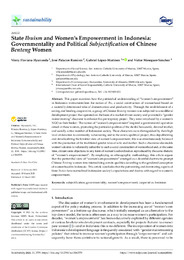Por favor, use este identificador para citar o enlazar este ítem:
https://hdl.handle.net/11000/30902
State Ibuism and Women’s Empowerment in Indonesia: Governmentality and Political Subjectification of Chinese Benteng Women
Título :
State Ibuism and Women’s Empowerment in Indonesia: Governmentality and Political Subjectification of Chinese Benteng Women |
Autor :
Hyunanda, Vinny Flaviana
Palacios Ramírez, José 
López-Martínez, Gabriel 
Meseguer-Sánchez, Víctor |
Editor :
MDPI |
Departamento:
Departamentos de la UMH::Ciencias Sociales y Humanas |
Fecha de publicación:
2021-03-23 |
URI :
https://hdl.handle.net/11000/30902 |
Resumen :
This paper examines how the patriarchal understanding of “women’s empowerment”
in Indonesia instrumentalizes the notion of Ibu, a social construction of womanhood based on
a societally determined idea of domestication and productivity. Through the establishment of a
saving and lending cooperative, a group of Chinese Benteng women was subjected to a neoliberal
development project that operated on the basis of a market-driven society and promoted a “gender
mainstreaming” discourse to enhance this participatory project. They were introduced by a women’s
NGO as their broker. The notion of “women’s empowerment” inspired a governmental operation
aimed at these women, promoting the particular qualities of the dutiful housewife, devoted mother,
and socially active member of Indonesian society. These characters were distinguished by their high
level of devotion to community volunteering and to the state’s apolitical project, thus depoliticizing
and deradicalizing the feminist view of women’s empowerment; this was simultaneously balanced
with the promotion of the traditional gender roles of wife and mother. Such a discourse also molds
women’s desires to voluntarily subscribe to such a social construction of womanhood and, at the same
time, circumvents objections to any form of women’s subordination reproduced by the same rhetoric
of “women’s empowerment”. By employing an ethnographic methodology, this article argues
that the patriarchal view of “women’s empowerment” emerged as a deceitful doctrine to prompt
Chinese Benteng women into internalizing certain qualities according to the gendered conception
of womanhood in Indonesia. This article concludes that the patronizing and dominating aspects of
State Ibuism have normalized Indonesian society’s expectations and desires with regard to women’s
empowerment.
|
Palabras clave/Materias:
subjectification
governmentality
women’s empowerment
cooperative
feminism |
Área de conocimiento :
CDU: Ciencias sociales: Demografía. Sociología. Estadística |
Tipo de documento :
info:eu-repo/semantics/article |
Derechos de acceso:
info:eu-repo/semantics/openAccess |
DOI :
https://doi.org/10.3390/su13063559 |
Aparece en las colecciones:
Artículos Ciencias Sociales y Humanas
|
 La licencia se describe como: Atribución-NonComercial-NoDerivada 4.0 Internacional.
La licencia se describe como: Atribución-NonComercial-NoDerivada 4.0 Internacional.
 La licencia se describe como: Atribución-NonComercial-NoDerivada 4.0 Internacional.
La licencia se describe como: Atribución-NonComercial-NoDerivada 4.0 Internacional.
.png)
